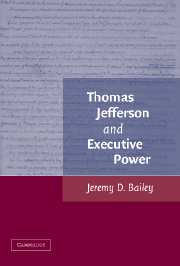Book contents
- Frontmatter
- Contents
- List of Figures and Table
- Preface
- Acknowledgments
- Abbreviations
- 1 “The execution of laws is more important than the making of them”: Reconciling Executive Power with Democracy
- 2 Executive Power and the Virginia Executive
- 3 Executive Power and the Constitution of 1787
- 4 “To place before mankind the common sense of the subject”: Declarations of Principle
- 5 The Real Revolution of 1800: Jefferson's Transformation of the Inaugural Address
- 6 To “produce a union of the powers of the whole”: Jefferson's Transformation of the Appointment and Removal Powers
- 7 The Louisiana Purchase
- 8 To “complete their entire union of opinion”: The Twelfth Amendment as Amendment to End All Amendments
- 9 “To bring their wills to a point of union and effect”: Declarations and Presidential Speech
- Development and Difficulties
- Index
Preface
Published online by Cambridge University Press: 24 July 2009
- Frontmatter
- Contents
- List of Figures and Table
- Preface
- Acknowledgments
- Abbreviations
- 1 “The execution of laws is more important than the making of them”: Reconciling Executive Power with Democracy
- 2 Executive Power and the Virginia Executive
- 3 Executive Power and the Constitution of 1787
- 4 “To place before mankind the common sense of the subject”: Declarations of Principle
- 5 The Real Revolution of 1800: Jefferson's Transformation of the Inaugural Address
- 6 To “produce a union of the powers of the whole”: Jefferson's Transformation of the Appointment and Removal Powers
- 7 The Louisiana Purchase
- 8 To “complete their entire union of opinion”: The Twelfth Amendment as Amendment to End All Amendments
- 9 “To bring their wills to a point of union and effect”: Declarations and Presidential Speech
- Development and Difficulties
- Index
Summary
The scholarly understanding of presidential power rests on two distinctions. The first distinction concerns the extent of the president's formal powers and the place of the presidency in the constitutional order. The other distinction contrasts the Founders' presidency against the modern presidency by emphasizing the extraconstitutional powers of twentieth-century presidents. The first distinction is often characterized as arising from the differences in the political thought of Alexander Hamilton and Thomas Jefferson, that is, between a generous and a narrow reading of the Constitution's grant of authority to the president. The second distinction supposes that the modern presidency escaped from the constraints imposed by the Founders' careful plan to separate and check power by looking beyond the Founders' Constitution for its resources and became, in some cases, precisely what the Founders tried to prevent. Because recent presidents eagerly exploit the constitutional hinges that allow the presidency to be strong, and because they bolster this strength with extraconstitutional devices, it is easy to conclude that the current presidency is both Hamiltonian and modern. As this scholarly understanding of the presidency puts it, Hamilton's case for implied powers, with its broad reading of the vesting clause in Article One, opened the space for later presidents to claim, as Theodore Roosevelt did, that they possess any power, not forbidden by the Constitution, to act on behalf of the people and for FDR to argue that the presidency needs the institutional resources to secure rights under modern conditions.
- Type
- Chapter
- Information
- Thomas Jefferson and Executive Power , pp. vii - xiiPublisher: Cambridge University PressPrint publication year: 2007



